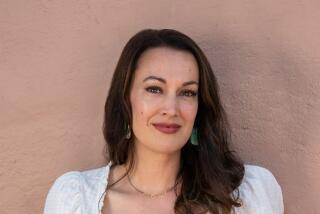We feel her pain -- maybe a bit too much
Welcome to the spin cycle: a week in the life of a middle-aged woman. On a typical day, sheâs working part time at a crafts emporium, taking care of her live-in mother-in-law, fielding calls from grown children (pregnant or in love), trying to determine over the phone whether her mother has Alzheimerâs, sending money to her crackhead sister and worrying about whether her sisterâs young children (200 miles away) have eaten in the last few days.
On one of these typical days she goes to her doctor to hear the results of some tests sheâs recently taken and learns that not only is she peri-menopausal (that dainty word), sheâs also pregnant. What? Forty-four, the kids finally out of the house, sheâs thinking maybe sheâll go to graduate school and, as they say on âBatmanâ: âBLAMMO!â
Sure, she cries a little on her break at the crafts store, but does she crack? Does she begin to self-destruct? Does she buy a fancy car or run away with a secretary? No, she does not. This woman, Marilyn Grimes, is made of iron. She may think her âcircuit breakersâ are not working. But for her strength alone, she is a hero.
More pressing to Marilyn than the issue of the baby is her flat tire of a 23-year marriage to dependable Leon. Heâs an engineer. Sex is not good. (âQuick Draw McGrawâ is Marilynâs affectionate nickname for him.) To make matters worse, he has been away on business trips more and more, leaving Marilyn to chauffeur his aging mother, Arthurine. Then he comes home with new clothes and a motorcycle. Marilyn, who can multitask with the best of them, doesnât see the signs of Leonâs midlife crisis until it is too late.
The pregnancy ends in miscarriage (though Marilyn was ready and willing to have the baby). The mother-in-law finds a boyfriend (leaving Marilyn the only one in the house without any passion in her life whatsoever). The crackhead sister gets worse. Marilyn is accepted into every graduate school she applies to. Oh, and she meets her soul-mate boyfriend (conveniently available) just days before her marriage collapses.
Through it all, Marilyn has the unflagging support of friends Paulette and Bunny. The three have once-a-month âPrivate Pity Partiesâ to relieve pressure. Paulette and Bunny go to the doctor with Marilyn when Leon is, typically, unavailable.
In this and other McMillan novels, these friendships (reminiscent of Amy Tanâs âThe Joy Luck Clubâ and many other popular novels) are the backbone of lives that would otherwise scatter to the four winds. They are delicious, enviable and entirely unusual in the real world, where middle-aged women often have difficulty keeping friendships alive (blame the spin cycle). Is any of this different because Marilyn Grimes is black? I donât think so.
This is McMillanâs sixth novel. Through them all, her writing has retained its characteristic warmth and page-turnability. Her stories are about everyday lives and her characters are memorable, if not indelible. Along the way, a reader picks up helpful hints on resourcefulness, fortitude in the face of difficulty and a calm sense of faith that, as my grandmother used to say somewhat ruefully, âLife goes on.â But McMillanâs widespread appeal, high sales and readability come with a price tag. Whatâs sacrificed is depth. Popular fiction often makes people feel OK about their lives, but it doesnât change the readers or the world they live in.
When a writer flings her net this wide, sheâs not going to create a character with the depth of Dostoevskyâs Raskolnikov. Fiction, thank God, is not populated solely by intensely complicated, truth-seeking or wildly deluded characters. Everyday life, as McMillan shows us so well, is full of distractions and complications.
But as much as I share many of Marilynâs problems, I still want fiction to rise slightly above this sorry world. It should offer a vision of what life can be or where we went wrong or what the true sources of happiness really are. By now, McMillan, who has the insight and the talent, ought to be doing more of that. She should, as they say, kick it up a notch. *


